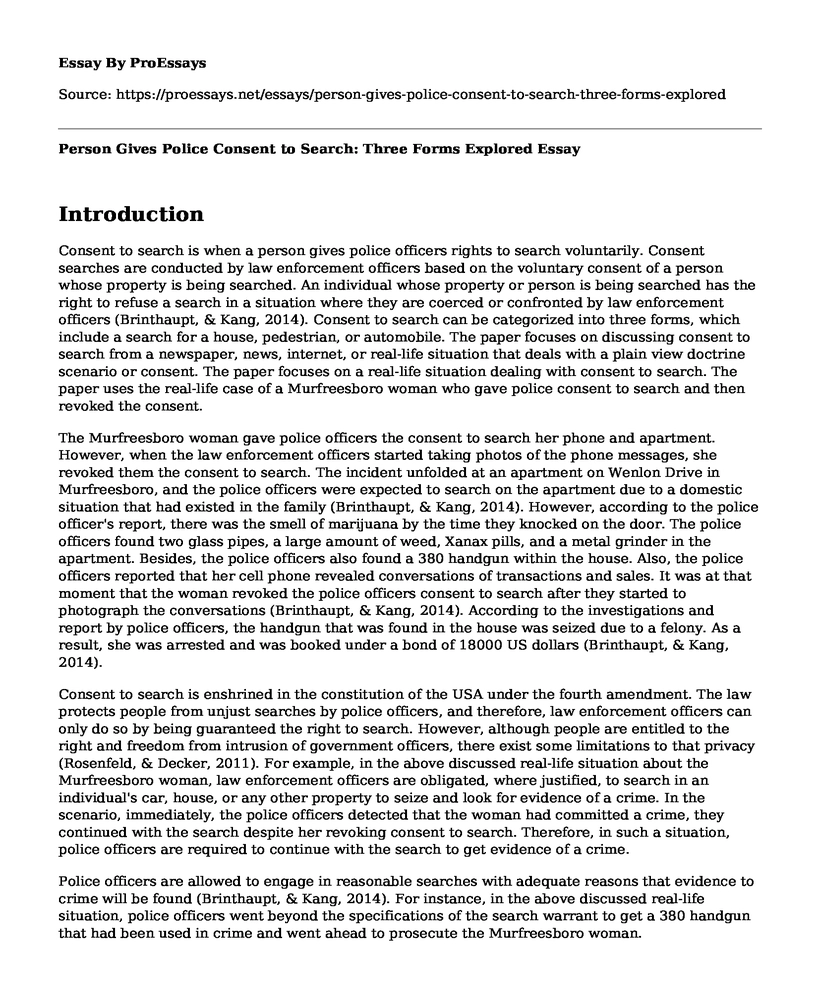Introduction
Consent to search is when a person gives police officers rights to search voluntarily. Consent searches are conducted by law enforcement officers based on the voluntary consent of a person whose property is being searched. An individual whose property or person is being searched has the right to refuse a search in a situation where they are coerced or confronted by law enforcement officers (Brinthaupt, & Kang, 2014). Consent to search can be categorized into three forms, which include a search for a house, pedestrian, or automobile. The paper focuses on discussing consent to search from a newspaper, news, internet, or real-life situation that deals with a plain view doctrine scenario or consent. The paper focuses on a real-life situation dealing with consent to search. The paper uses the real-life case of a Murfreesboro woman who gave police consent to search and then revoked the consent.
The Murfreesboro woman gave police officers the consent to search her phone and apartment. However, when the law enforcement officers started taking photos of the phone messages, she revoked them the consent to search. The incident unfolded at an apartment on Wenlon Drive in Murfreesboro, and the police officers were expected to search on the apartment due to a domestic situation that had existed in the family (Brinthaupt, & Kang, 2014). However, according to the police officer's report, there was the smell of marijuana by the time they knocked on the door. The police officers found two glass pipes, a large amount of weed, Xanax pills, and a metal grinder in the apartment. Besides, the police officers also found a 380 handgun within the house. Also, the police officers reported that her cell phone revealed conversations of transactions and sales. It was at that moment that the woman revoked the police officers consent to search after they started to photograph the conversations (Brinthaupt, & Kang, 2014). According to the investigations and report by police officers, the handgun that was found in the house was seized due to a felony. As a result, she was arrested and was booked under a bond of 18000 US dollars (Brinthaupt, & Kang, 2014).
Consent to search is enshrined in the constitution of the USA under the fourth amendment. The law protects people from unjust searches by police officers, and therefore, law enforcement officers can only do so by being guaranteed the right to search. However, although people are entitled to the right and freedom from intrusion of government officers, there exist some limitations to that privacy (Rosenfeld, & Decker, 2011). For example, in the above discussed real-life situation about the Murfreesboro woman, law enforcement officers are obligated, where justified, to search in an individual's car, house, or any other property to seize and look for evidence of a crime. In the scenario, immediately, the police officers detected that the woman had committed a crime, they continued with the search despite her revoking consent to search. Therefore, in such a situation, police officers are required to continue with the search to get evidence of a crime.
Police officers are allowed to engage in reasonable searches with adequate reasons that evidence to crime will be found (Brinthaupt, & Kang, 2014). For instance, in the above discussed real-life situation, police officers went beyond the specifications of the search warrant to get a 380 handgun that had been used in crime and went ahead to prosecute the Murfreesboro woman.
Conclusion
The law protects individuals from the intrusion of police officers in their properties without their consent. People are expected to report to police officers and give them consent to search and may revoke it when they want. However, in instances where law enforcement agencies feel justified that a particular search will assist in getting evidence to a crime, they are allowed to search as described in the Murfreesboro real-life situation discussed above.
References
Brinthaupt, T. M., & Kang, M. (2014). Many-faceted Rasch calibration: An example using the self-talk scale. Assessment, 21(2), 241-249. Retrieved from
https://scholar.google.com/scholar?hl=en&as_sdt=0%2C5&q=Brinthaupt%2C+T.+M.%2C+%26+Kang%2C+M.+%282014%29.+Many-faceted+rasch+calibration%3A+An+example+using+the+self-talk+scale.+Assessment%2C+21%282%29%2C+241-249.+&btnG=
Rosenfeld, R., & Decker, S. H. (2011). Consent to search and seize: Evaluating an innovative youth firearm suppression program. Law & Contemp. Probs., 59, 197. Retrieved from
https://scholar.google.com/scholar?hl=en&as_sdt=0%2C5&q=Consent+to+search&btnG=#d=gs_cit&u=%2Fscholar%3Fq%3Dinfo%3AgOBKx4E2GlsJ%3Ascholar.google.com%2F%26output%3Dcite%26scirp%3D0%26hl%3Den
Cite this page
Person Gives Police Consent to Search: Three Forms Explored. (2023, Jan 28). Retrieved from https://proessays.net/essays/person-gives-police-consent-to-search-three-forms-explored
If you are the original author of this essay and no longer wish to have it published on the ProEssays website, please click below to request its removal:
- Police Fume at Security Firms: Article Review
- Ethical Conducts Essay Example
- Description of the Village: Western Outskirts of Mumbai City, India
- Graham v Connor Case Study
- Source Water: Protecting Our Drinking Water Supply - Essay Sample
- Autonomous Cars: Reducing Road Accidents by 94% - Essay Sample
- Essay Sample on Police Presence in Sentinel City: Crime Rates by Neighborhood







